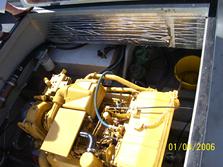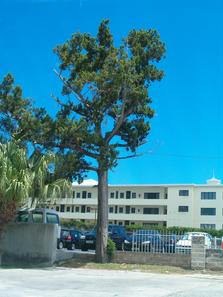Our snorkel boat is powered by a Caterpillar 3208TA rated at 375HP. We have tried to calculate our carbon footprint based on fuel consumption, but we have found that these figures can vary widely depending on which website you consult, most of which have a link to a company selling carbon credits. There is also lots of contradictory opinions on which trees are best suited for the task and where they are best grown. It seems the only thing they agree on is plants absorb carbon dioxide by turning the carbon into biomass (wood and leaves) and free the oxygen from the absorbed carbon dioxide. In case you forgot your high school biology, all life on Earth is carbon based. Typically these carbon credit websites have very little information on where your money is being spent and by whom. Given the rather ambiguous nature of these companies, we have opted for the "think globally, act locally" plan.
This plan involves our very own endemic and endangered Juniperus Bermudiana, commonly known as the Bermuda Cedar. Sometime in the mid 1940s, we accidentally introduced two species of scale insect to the island from the US, which by the late 1970s, had killed off an estimated 8 million cedars, or 99% of the cedar forest. Luckily, the surviving 1% were naturally resistant to the pests, and are the base of our reforestation project. So what we're doing is going to help an edangered species while absorbing some of our carbon and creating shade which is indispensable for summertime outdoor relaxation.
What we're going to do is plant at least two cedar trees per year of operation. We are going to plant them in areas zoned "green". Laws here prohibit the felling of Bermuda cedar under most circumstances, and is definitely a no-no in areas zoned as protected, woodland reserve, or green. This way our trees have the best chance of completing their life cycle, which can be well in excess of 300 years. To supplement this, I also water Caroline's plants (of which there are many) most days, a task which in previous years would have annoyed me, but they make our dock look good as well as remove some CO2 from the atmosphere.
|
 |
| Big Bad Cat 3208 |
|
|
 |
| Juniperus Bermudianis |
|
|
| |
Go here to learn about previous attempts to save our cedar
|
|
|